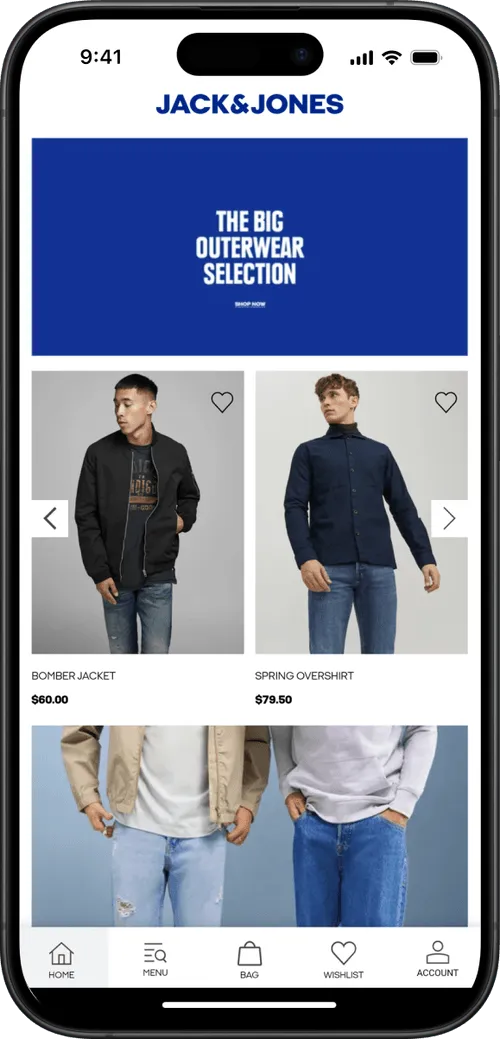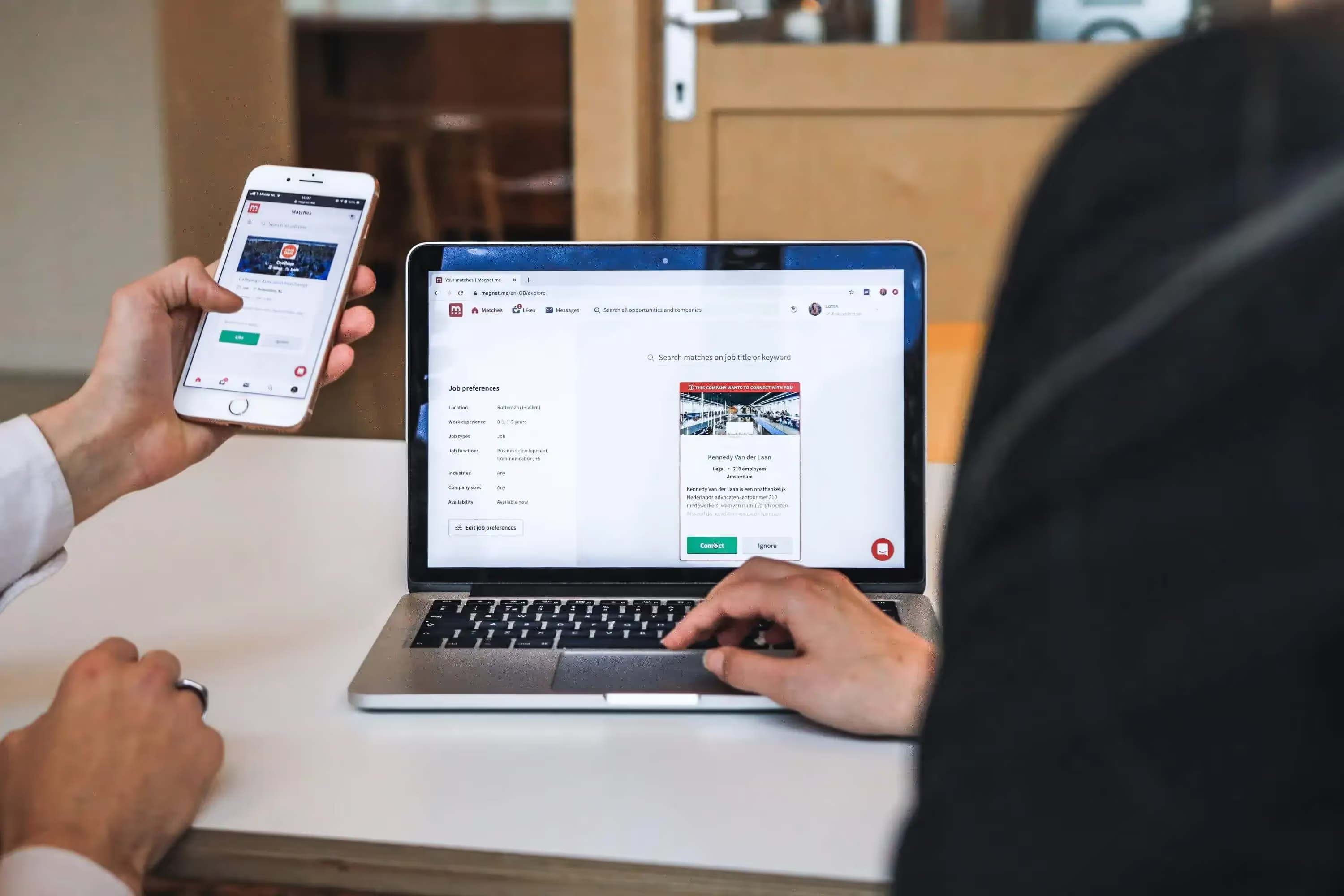8 Benefits of Mobile Apps for Your Business (And 4 For Your Users)
- Mobile apps lift retention and revenue by turning web visitors into high-frequency, high-LTV customers you can reach for free with push.
- Apps give you first-party data, and allow you to offer more exclusive experiences, with less friction for users.
- With modern “web-to-app” platforms like MobiLoud, launching an iOS and Android app now costs a fraction of custom builds, making the ROI too good to ignore.
- Mobile apps lift retention and revenue by turning web visitors into high-frequency, high-LTV customers you can reach for free with push.
- Apps give you first-party data, and allow you to offer more exclusive experiences, with less friction for users.
- With modern “web-to-app” platforms like MobiLoud, launching an iOS and Android app now costs a fraction of custom builds, making the ROI too good to ignore.
Today, most customer journeys start and finish on mobile devices.
More than half of all internet traffic comes on mobile. Mobile dominates ecommerce. And most web-first businesses are missing one of the most powerful assets for the mobile customer experience; a mobile app.
Only 4.5% of successful ecommerce businesses have an app. The numbers are similar in other segments, such as SaaS, publishing, and membership sites. That means the majority of businesses are missing out on some powerful benefits.
We're going to explore those benefits in this article. Keep reading and learn all the top benefits of mobile apps - for both your business, and your customers.
MobiLoud helps businesses like yours launch fast, powerful mobile apps - with none of the overhead of custom development. Learn more: check out the benefits of turning your website into an app with MobiLoud.
The Benefits of Mobile Apps for Businesses (Greater Retention, Higher Revenue & Profits)
A mobile app isn't just a vanity project. It's a powerful (mobile-first) customer engagement tool for your brand.
Mobile apps help build stronger customer relationships, drive higher revenue, and create a powerful moat for your business.
And with the cost of building an app today (assuming your business already has a mobile-optimized website), the ROI is almost too good to ignore.
Let's dive deeper into the biggest benefits of mobile apps for your business.
1. Increased Retention and Customer Loyalty
Many businesses in many different industries struggle with retention. It's very difficult to get customers consistently coming back to your website.
Your app lives on your customer’s home screen; always just a tap away.
That kind of visibility and convenience makes it far more likely for your customers to return.
Mobile apps average more repeat visits, more purchases (app users purchase 3-7x more often), and overall much better customer retention than websites.
“When looking at weekly visits by traffic sources across mobile and desktop experiences, we saw that app direct visitors are nearly 6x more loyal than platform visitors.” - Chartbeat

2. Direct, High-Impact Communication
Mobile apps give you access to mobile push notifications.

Push notifications cut through the noise in a way email and SMS just can’t anymore.
With open rates of 80-90%, they're one of the most effective tools you have for driving action.
Whether you’re promoting a sale, chasing after abandoned carts, announcing a new product drop, or sharing breaking news, apps let you reach your audience instantly, with messages that actually get seen.
3. Better Revenue Metrics
When customers use your app, they have longer sessions, more frequent sessions, and convert at 3x as often.
Apps reduce distractions, keeping the user attentive and engaged for longer, and makes every part of the experience smoother for smartphone users.
It's easy to get into the app. Native payment options like Apple Pay and Google Pay make paying easy.
There are fewer drop-offs, less friction, and a much higher chance of turning visits into purchases.
This all adds up to more revenue for your business.
4. Better Profit and Sustainability
Most business are built on a foundation of sand. They rely on paid acquisition (Google/Meta ads), algorithms (Google Search) or inconsistent referral traffic for the bulk of their sales.
Mobile apps let you own your customers. You get a direct line to their home screen. You don't have to worry about being throttled by an algorithm, or constantly rising acquisition costs.
Revenue you make from app users is all profit. Push notifications cost nothing to send, and there's no ad spend to stay on your customer's home screen.
The more engagement comes through your app, the more profitable, and sustainable your business becomes.
5. Enhanced Visibility and Brand Authority
Your brand being in the App Store and Google Play Store adds a new layer of legitimacy.
It puts your brand in a place reserved for established players, and trustworthy companies.
It also gives you new ways to be found. People can find you through the app stores. Your brand shows up in more organic searches.
You're easier to find, and harder to forget.

6. Personalization & First-Party Data
Businesses are struggling for reliable data from their customers today.
Cookies, stringent privacy protections from platforms like iOS, are making it difficult to track user behavior and understand your audience.
A mobile app is a source of first-party data. It's an owned platform, where you own all the analytics and all the data.
This allows you much better insights into your customers, and the ability to build hyper-personalized, hyper-relevant experiences.
7. Expanded Revenue Streams
Your app can also open up new ways to monetize and engage your audience.
In-app memberships. Exclusive product drops. App-only content and experiences. In-app purchases. Loyalty programs that integrate with the real world.
Apps give you the ideal sandbox to test and scale new revenue plays (without a third-party controlling what you can and can't do).

8. A Better User Experience
Apps are a better experience for your users too.
That's why 90% of mobile time is spent on apps. Users spend an average of 3.5 hours per day using apps, compared to less than half an hour on mobile browsers.
More user engagement is a win for your business. It means higher customer satisfaction, more time spent with your brand, and more valuable customer interactions.
Even if your app just mirrors your website, it still feels better to use for returning customers than having to remember and type the URL every time. That's why app users stick around for much longer.
Ready to explore launching your own mobile app? It's easy - and you could be live in less than a month. Get a free preview of your app to see what's possible.
Benefits of Mobile Apps for Users (More Convenient, Mobile-First UX)
We’ve talked about the business upside. But your customer base aren't begrudgingly using apps. Your best customers will willingly download your app, because the user experience is so much better.
Here’s what makes apps a win from your customers’ point of view:
1. Speed and Convenience
Apps are faster, more efficient, more convenient.
It's not just a tech thing. While native apps load content faster, even hybrid apps (which are mostly built from the same code as a website) are still smoother and faster to use.

You can open from one tap on the home screen. No typing a URL, no browser tabs. Automatically logged in. Smoother navigation, fast checkout, with mobile payments integrated by default.
2. Personalized and Relevant Experiences
Again, direct access to first-party data is not just a win for you. It's a win for your customer.
Brands are able to create more personalized, more relevant experiences. The experience in an app feels tailored to the user.
It makes them feel more like a VIP. Like the app is built for them; on the web, you're just one of millions.
3. Native Features
Mobile websites are built for the browser; and most are built for desktop browsers.
The mobile browser experience has gotten a lot better, but it's still a square peg in a round hole, not made for mobile users.
Apps are built specifically for mobile devices. They open up native device features, like push notifications, camera and GPS integration, and offline mode (in some cases).
All of this elevates the user experience in a way the browser can't.
4. Exclusivity
If there's one thing your customers crave more than anything, it's exclusivity.
They want to feel special. They want to be a VIP. They want perks and content and access to experiences that not everyone has.
Exclusive product drops, early access, these are perks that customers will gladly download an app for.
How to Build Your Own Mobile App
Launching your own mobile app is a great way to make meaningful progress towards your business goals.
Yet for many, mobile app development feels daunting. It's a new, possibly costly, time-consuming endeavor.
But if you already have a website, and it's already well-optimized for mobile, creating a mobile app is easy with our web to app platform, MobiLoud.
It's a low cost, all the work is done for you, and you'll get apps for both iOS and Android operating systems that look and feel like million-dollar native apps.

The apps fully replicate your web experience, with the necessary native mobile features added on top. All up, you could be live in less than a month.
Here's how it works:
- Connect your website and book your onboarding call
- Our team reviews your site and configures the first version of your app within 1 business day.
- Once you receive your app preview, we'll help customize the app’s design, navigation, and branding based on your feedback. We'll align on final details to get your app ready for testing.
- Test your app on real devices. We'll do our own testing, and implement any final updates based on your team’s feedback.
- Prepare for launch. We submit your app to the App Store and Google Play, manage approvals, and provide promotional templates and assets to help you plan your rollout.
- Launch your app to your customers. We help you set up app marketing campaigns, as well as push notifications (welcome sequences, cart abandonment reminders).
We help you every step of the way to start building customer loyalty, increasing repeat purchases, and boosting retention from day one.
MobiLoud handles everything. From app configuration, to testing, app store submission, and post-launch maintenance.
You get a polished, branded app, that provides a seamless user experience for your users, backed by a team that’s done this thousands of times.
MobiLoud is great for ecommerce apps, SaaS apps, marketplaces, digital publishers, and more. Want to see what kind of businesses are thriving with MobiLoud? Check out these case studies.
Wrapping Up
When you put it all together, it’s clear: mobile apps offer numerous advantages for today's businesses.
From providing a more engaging experience for users, to higher retention rates, mobile apps are the best way to connect with your customers and get more revenue.
Apps aren't just marketing channels. They're a direct line to your customers' mobile phones.
And the best news is, with MobiLoud, you can build an app with all the essential features of a native app, and none of the downsides.
Interesting? Get a free preview of your app now to see what's possible.
FAQs
Convert your website into a mobile app












